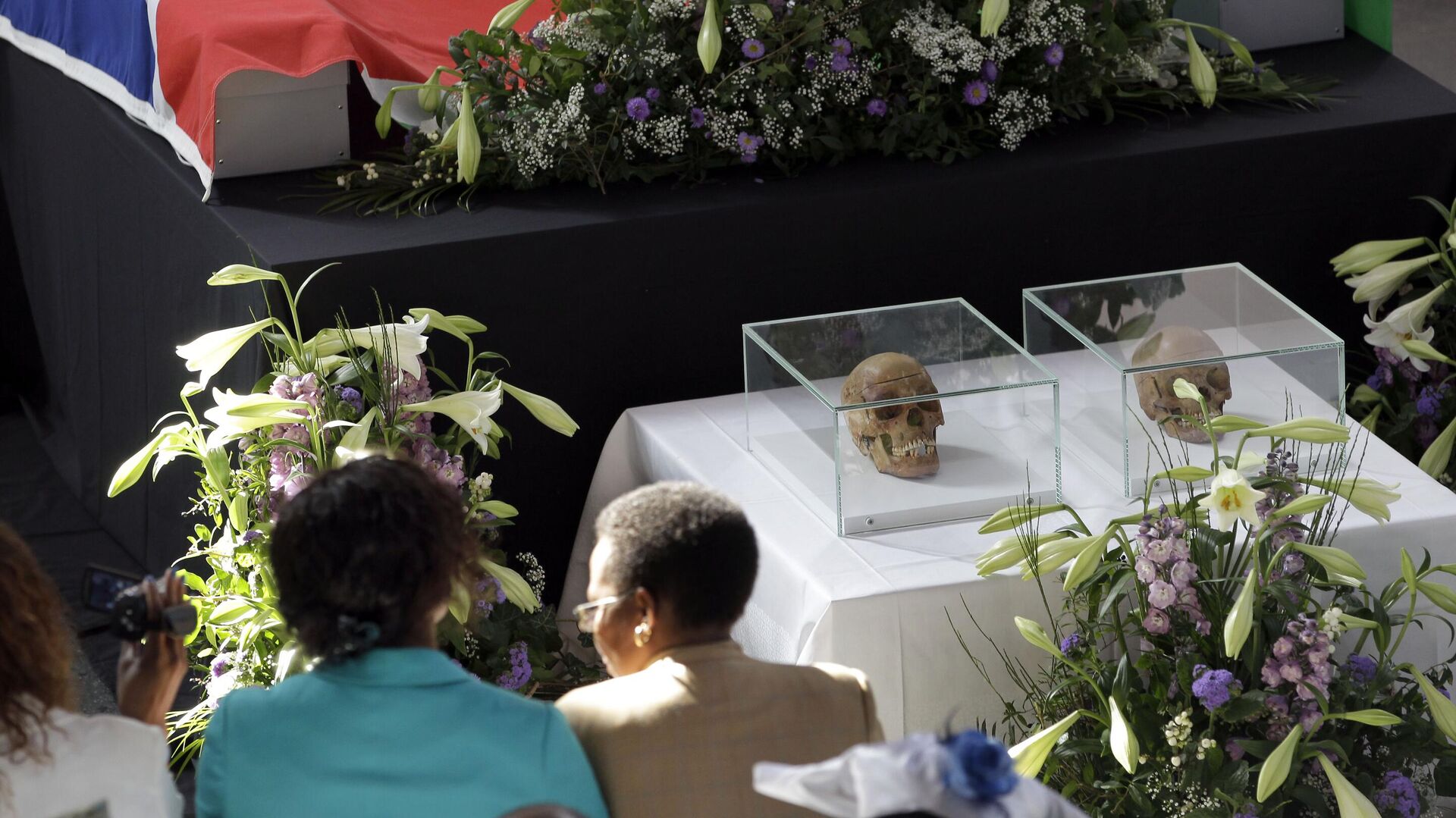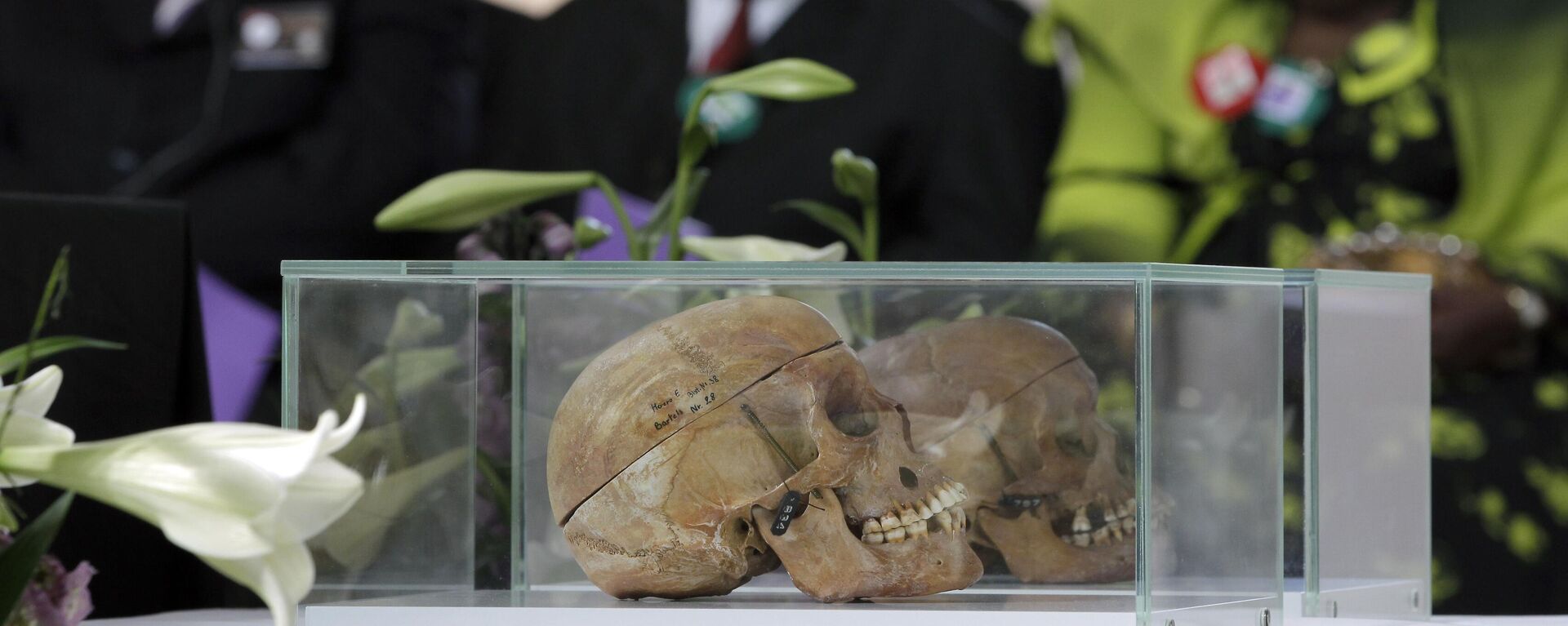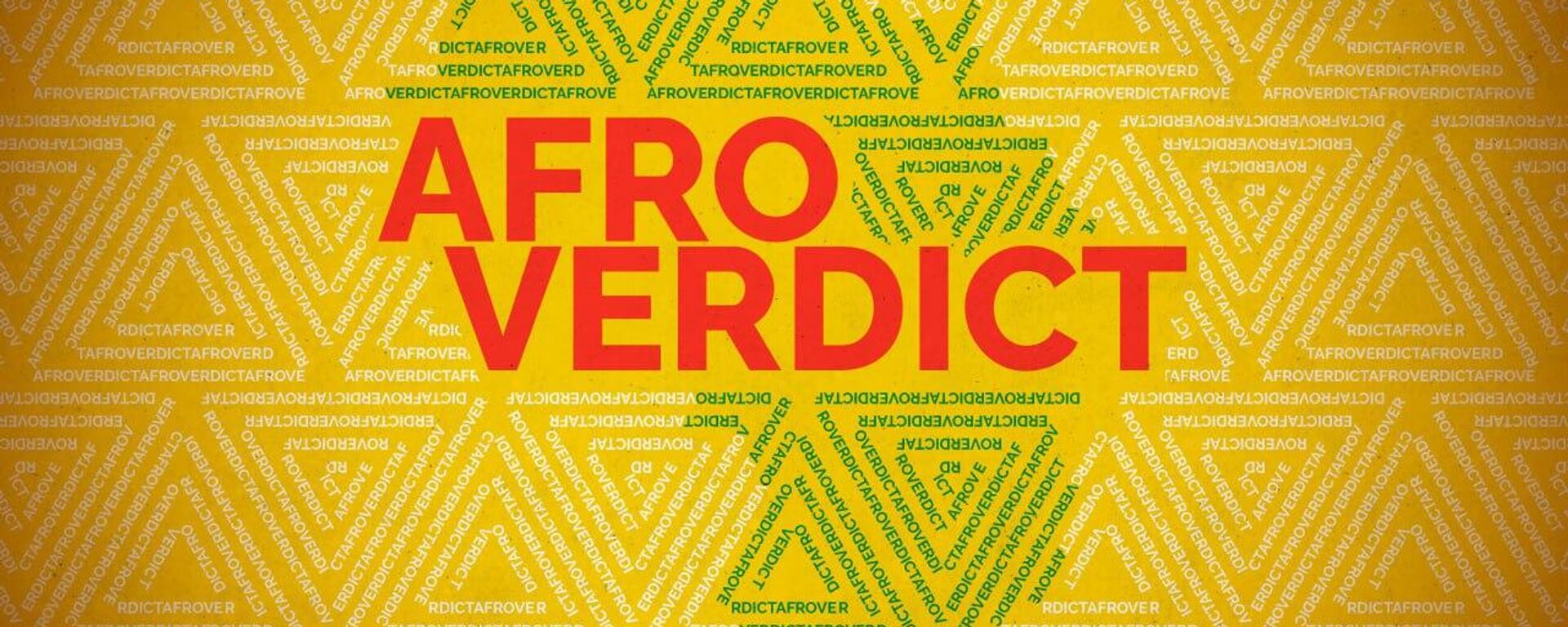https://en.sputniknews.africa/20240120/germanys-backing-of-israel-contradicts-its-genocide-history-in-namibia-herero-traditional-leader-1064708020.html
Germany's Backing of Israel Contradicts Its Genocide History in Namibia: Herero Traditional Leader
Germany's Backing of Israel Contradicts Its Genocide History in Namibia: Herero Traditional Leader
Sputnik Africa
Last week, Namibia condemned Berlin's decision to reject genocide charges against Israel at the ICJ. Namibia, where the first genocide of the 20th century took... 20.01.2024, Sputnik Africa
2024-01-20T14:08+0100
2024-01-20T14:08+0100
2024-01-20T14:09+0100
sub-saharan africa
germany
israel
namibia
southern africa
genocide
south africa
international court of justice (icj)
israeli-palestinian conflict
palestine
https://cdn1.img.sputniknews.africa/img/07e8/01/14/1064709688_0:424:2886:2047_1920x0_80_0_0_aeb055450a04bf5eb58486f8e8499666.jpg
Germany's rush to support Israel in South Africa's genocide case against the Jewish state at the International Court of Justice (ICJ) contradicts its historical responsibility for the genocide of the Herero and Nama people in Namibia, Prof. Mutjinde Katjiua, Paramount Chief of the Ovaherero Traditional Authority, a transnational body representing the Herero people throughout Southern Africa, told Sputnik Africa in an interview.In 2021, Germany officially recognized the genocide perpetrated against Namibia's Herero and Nama communities between 1904 and 1908 during its colonial rule of the southern African country. However, the former European colonial power refused to accept responsibility for reparations to the Herero and Nama peoples, whose populations were reduced by at least 70% and 50%, respectively, as a result of German atrocities.Katjiua praised Namibia's support for South Africa's ICJ case against Israel over the ongoing bombardment of the besieged Palestinian Gaza Strip, where Israeli attacks have killed more than 24 500 civilians, according to the enclave's authorities. He also emphasized the importance of preventing further violence and potential genocide against the Palestinian people.Discussing Berlin's acknowledgment of the Namibian genocide in 2021, Prof. Katjiua highlighted the inadequacy of Germany's measures for reparations. He underscored that Germany has failed to address the issue of reparations, and did not fully recognize the genocide's victims. He also emphasized that the declaration focused only on development aid to Namibia, neglecting the critical issues of reparations and justice for the victims who fled the genocide and were scattered throughout Southern Africa, in countries such as Botswana, South Africa and Angola, among other places.Attributing the genocide of the Herero and Nama to the ideology of "racial superiority" and colonial expansion, Prof. Katjiua explained the motives behind Germany's extermination orders and systematic killings. He emphasized that colonial Germany's quest for land and resources led to war and the deliberate extermination of the Herero and Nama people.Furthermore, Prof. Katjiua expounded on the long-term effects of German colonial rule, citing the drastic reduction of the Herero and Nama population from a potential 40% to a mere 7% of Namibia's current population. He described Germany's colonial atrocities as a poignant case study for African countries, emphasizing the need for other former colonies to seek reparations from their former colonial powers.Prof. Katjiua underscored the significance of the 2006 parliamentary resolution in Namibia, which recognized the Herero and Nama genocide and called for negotiations between the perpetrator state, Germany, and the victims of genocide, with the Namibian government as a facilitator.The tribal leader noted that the Namibian government "cannot actually" represent victims who are not Namibian citizens, and stressed the need for talks to take place in a format that would allow all victims to receive justice and have their interests addressed.He emphasized that "reparations should not only be monetary, but also should address the return of land and addressing issues of cultural genocide."Commenting on the relationship between Namibia and its former colonial ruler, Evelyn Mswetsa, representative of the Ovaherero Traditional Authority in South Africa, complained of "hypocrisy" in addressing the issue of the Heroro-Nama genocide, saying that the actual victims are "sidelined" in every discussion of the issue.Drawing attention to recent events, Mswetsa emphasized the expectation that Namibia's firm stance on Germany's approach to the Palestinian genocide should lead to a more inclusive approach in discussions concerning the Namibian genocide.In late December, South Africa filed an emergency case at the ICJ arguing that Israel stands in breach of the UN Genocide Convention, signed in 1948 in the wake of the Holocaust, and wants the court to "immediately" stop its military operations in Gaza which began after the October 7 Hamas attacks. As of January 20, the conflict entered its 106th day, with more than 24,600 Palestinian civilians killed so far in Gaza as a result of Israeli strikes, according to local authorities.
https://en.sputniknews.africa/20240116/rooted-in-lived-experience-why-namibia-objects-to-german-support-for-israel-in-icj-case-1064641365.html
https://en.sputniknews.africa/20240119/a-reminder-of-germanys-genocide-after-it-supported-israel-at-icj-case-1064698753.html
germany
israel
namibia
southern africa
south africa
palestine
gaza
Sputnik Africa
feedback@sputniknews.com
+74956456601
MIA „Rossiya Segodnya“
2024
Muhammad Nooh Osman
https://cdn1.img.sputniknews.africa/img/07e7/04/0a/1058467512_0:0:1280:1280_100x100_80_0_0_ec723833bcbfcaed2e21952965ad99e4.jpg
Muhammad Nooh Osman
https://cdn1.img.sputniknews.africa/img/07e7/04/0a/1058467512_0:0:1280:1280_100x100_80_0_0_ec723833bcbfcaed2e21952965ad99e4.jpg
News
en_EN
Sputnik Africa
feedback@sputniknews.com
+74956456601
MIA „Rossiya Segodnya“
Sputnik Africa
feedback@sputniknews.com
+74956456601
MIA „Rossiya Segodnya“
Muhammad Nooh Osman
https://cdn1.img.sputniknews.africa/img/07e7/04/0a/1058467512_0:0:1280:1280_100x100_80_0_0_ec723833bcbfcaed2e21952965ad99e4.jpg
germany, israel, namibia, southern africa, genocide, south africa, international court of justice (icj), israeli-palestinian conflict, palestine, gaza, war crimes
germany, israel, namibia, southern africa, genocide, south africa, international court of justice (icj), israeli-palestinian conflict, palestine, gaza, war crimes
Germany's Backing of Israel Contradicts Its Genocide History in Namibia: Herero Traditional Leader
14:08 20.01.2024 (Updated: 14:09 20.01.2024) Muhammad Nooh Osman
Writer/Editor
Exclusive
Last week, Namibia condemned Berlin's decision to reject genocide charges against Israel at the ICJ. Namibia, where the first genocide of the 20th century took place under German colonial rule, accused Berlin of "ignoring" the "deaths of over 23,000 Palestinians in Gaza" and defending "the genocidal and gruesome acts of the Israeli government."
Germany's rush to support Israel in South Africa's genocide
case against the Jewish state at the International Court of Justice (ICJ) contradicts its historical responsibility for the genocide of the Herero and Nama people in Namibia,
Prof. Mutjinde Katjiua, Paramount Chief of the Ovaherero Traditional Authority, a transnational body representing the Herero people throughout Southern Africa, told
Sputnik Africa in an interview.
In 2021, Germany officially recognized the genocide perpetrated against Namibia's Herero and Nama communities between 1904 and 1908 during its colonial rule of the southern African country. However, the former European colonial power refused to accept responsibility for reparations to the Herero and Nama peoples, whose populations were reduced by at least 70% and 50%, respectively, as a result of German atrocities.
Katjiua praised Namibia's
support for South Africa's ICJ case against Israel over the ongoing bombardment of the besieged Palestinian Gaza Strip, where Israeli attacks have killed more than 24 500 civilians, according to the enclave's authorities. He also emphasized the importance of preventing further violence and potential genocide against the Palestinian people.
"As Ovaherero Traditional Authority, we also support Namibia's position because we cannot really understand why Germany would rush to support Israel in claiming that Israel is not perhaps in the process of committing a war crime or genocide. We see that as a contradiction given Germany's history in Namibia or also elsewhere in committing genocide," the tribal leader said in an exclusive interview.
Discussing Berlin's acknowledgment of the Namibian genocide in 2021, Prof. Katjiua highlighted the inadequacy of Germany's measures for reparations. He underscored that Germany has failed to address the issue of reparations, and did not fully recognize the genocide's victims.
"Germany has not taken any measure to address reparations. In fact, in the joint declaration between the state of Namibia and Germany denies that what happened in Namibia was a genocide," the traditional leader said. "In fact, they agreed to a phrasing that what has happened could be regarded as a genocide from today's perspective. But when it took place at the time that it took place, it was not a genocide."
He also emphasized that the declaration focused only on development aid to Namibia, neglecting the critical issues of reparations and justice for the victims who fled the genocide and were scattered
throughout Southern Africa, in countries such as Botswana, South Africa and Angola, among other places.
Attributing the genocide of the Herero and Nama to the ideology of "racial superiority" and colonial expansion, Prof. Katjiua explained the motives behind Germany's extermination orders and systematic killings. He emphasized that colonial Germany's quest for land and resources led to war and the deliberate extermination of the Herero and Nama people.
"Germany, at the time, was driven by the ideology of a superior race, the Aryan race, as being superior to any other race in the world. And Germany was then trying to occupy the rest of the world, Africa in our cases, driven by what they referred to as living space," Katjiua told Sputnik Africa. "Hereros and Namas did not want to give their land. And as a result, tensions grew to the extent that a war broke out and Germany decided that they were going to exterminate the Hereros and Namas."
Furthermore, Prof. Katjiua expounded on the long-term effects of German colonial rule, citing the drastic reduction of the Herero and Nama population from a potential 40% to a mere 7% of Namibia's current population. He described
Germany's colonial atrocities as a poignant case study for African countries, emphasizing the need for other former colonies to seek reparations from their former colonial powers.
Prof. Katjiua underscored the significance of the 2006 parliamentary resolution in Namibia, which recognized the Herero and Nama genocide and called for negotiations between the perpetrator state, Germany, and the victims of genocide, with the Namibian government as a facilitator.
"So we are still demanding that there should be that tripartite arrangement for negotiating a settlement how reparations could be addressed, and therefore, we, the Hereros and Namas are better placed because we represent the Hereros and Namas across the various nationalities where they are, in countries like Botswana, South Africa and elsewhere," he said.
The tribal leader noted that the Namibian government "cannot actually" represent victims who are not Namibian citizens, and stressed the need for talks to take place in a format that would allow all victims to receive justice and have their interests addressed.
He emphasized that "reparations should not only be monetary, but also should address the return of land and addressing issues of cultural genocide."
"Those interests, at first, we look at issues like, the land that was confiscated from the Hereros and Namas, restitution programs for that land, ancestral land that is now in the hands of descendants of German colonizers," Katjiua said. "And the other issue is the trauma, intergenerational trauma that has taken place that is still traumatizing our people, the loss of culture, people that are in South Africa, Botswana, elsewhere that have lost culture and language."
Commenting on the relationship between Namibia and its former colonial ruler, Evelyn Mswetsa, representative of the Ovaherero Traditional Authority in South Africa, complained of "hypocrisy" in addressing the issue of the Heroro-Nama genocide, saying that the actual victims are "sidelined" in every discussion of the issue.
"Germany is using the neediness of Namibian government to sweep the atrocities they committed under the carpet. They don't even want to admit that what they did was Genocide," Mswetsa told Sputnik Africa.
Drawing attention to recent events, Mswetsa emphasized the expectation that Namibia's firm stance on Germany's approach to the Palestinian genocide should lead to a more inclusive approach in discussions concerning the Namibian genocide.
"Now that Namibia is vocal about Germany's stance on Palestinians' Genocide, we expect them to involve the actual victims in the whole matter as they talk to Germany. They need to take a bold stance," The South African national said. "It cannot be Namibian government and Germany because we exist in the Diaspora, and our representation in Namibia will be the Paramount Chief."
In late December, South Africa filed an emergency
case at the ICJ arguing that Israel stands in breach of the UN Genocide Convention, signed in 1948 in the wake of the Holocaust, and wants the court to "immediately" stop its military operations in Gaza which began after the October 7 Hamas attacks. As of January 20, the conflict entered its 106th day, with more than 24,600 Palestinian civilians killed so far in Gaza as a result of Israeli strikes, according to local authorities.




